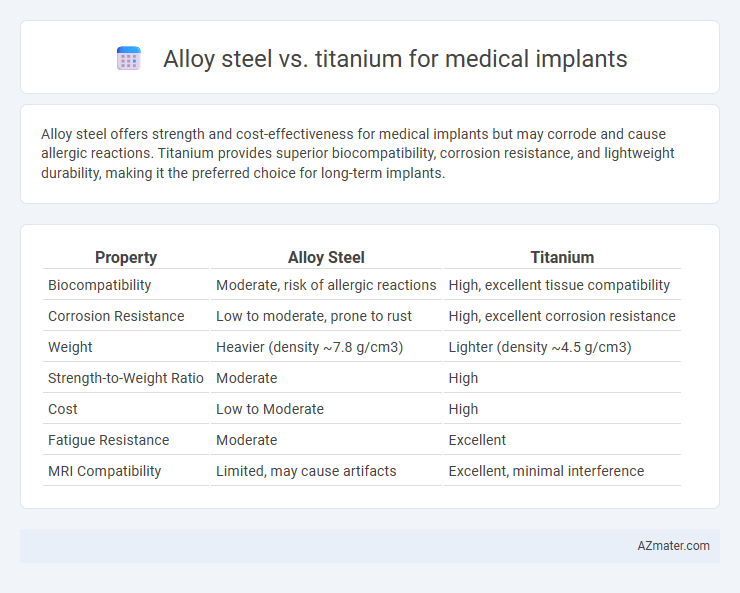Alloy steel offers strength and cost-effectiveness for medical implants but may corrode and cause allergic reactions. Titanium provides superior biocompatibility, corrosion resistance, and lightweight durability, making it the preferred choice for long-term implants.
Table of Comparison
| Property | Alloy Steel | Titanium |
|---|---|---|
| Biocompatibility | Moderate, risk of allergic reactions | High, excellent tissue compatibility |
| Corrosion Resistance | Low to moderate, prone to rust | High, excellent corrosion resistance |
| Weight | Heavier (density ~7.8 g/cm3) | Lighter (density ~4.5 g/cm3) |
| Strength-to-Weight Ratio | Moderate | High |
| Cost | Low to Moderate | High |
| Fatigue Resistance | Moderate | Excellent |
| MRI Compatibility | Limited, may cause artifacts | Excellent, minimal interference |
Introduction to Medical Implant Materials
Alloy steel and titanium serve distinct roles in medical implants due to their differing mechanical properties and biocompatibility. Titanium exhibits excellent corrosion resistance and superior biocompatibility, making it ideal for long-term implants such as joint replacements and dental implants. In contrast, alloy steel offers high strength and cost-effectiveness but may require surface modifications to improve corrosion resistance and compatibility within the human body.
Overview of Alloy Steel in Medical Applications
Alloy steel in medical implants is valued for its high strength, durability, and cost-effectiveness, commonly used in orthopedic devices such as screws, plates, and joint replacements. Its excellent mechanical properties and resistance to wear make it suitable for load-bearing implants, although corrosion resistance is often enhanced with surface treatments or coatings. The biocompatibility of alloy steel is adequate but generally lower than titanium, requiring careful consideration in long-term implantation scenarios.
Overview of Titanium in Medical Implants
Titanium is widely used in medical implants due to its exceptional biocompatibility, corrosion resistance, and high strength-to-weight ratio, making it ideal for long-term bodily integration. This metal's ability to promote osseointegration supports faster healing and stable implant fixation, especially in orthopedic and dental applications. Titanium alloys, such as Ti-6Al-4V, enhance mechanical properties while maintaining minimal allergenic potential, positioning titanium as a superior choice over alloy steel in critical implant devices.
Biocompatibility: Alloy Steel vs Titanium
Titanium exhibits superior biocompatibility compared to alloy steel, making it the preferred choice for medical implants due to its excellent corrosion resistance and minimal risk of allergic reactions or toxicity. Alloy steel, while strong and durable, is prone to corrosion and may release metal ions that can cause inflammation or adverse tissue responses. The bioinert nature of titanium allows for better osseointegration and long-term stability in the human body.
Mechanical Properties Comparison
Alloy steel offers high tensile strength and excellent wear resistance, making it a durable option for medical implants subjected to mechanical stress. Titanium, however, provides superior strength-to-weight ratio and exceptional corrosion resistance, crucial for long-term biocompatibility and minimizing implant rejection. The fatigue resistance of titanium surpasses that of alloy steel, enhancing implant longevity under cyclic loading conditions in the human body.
Corrosion Resistance and Longevity
Titanium exhibits superior corrosion resistance compared to alloy steel due to its stable oxide layer that prevents degradation in bodily fluids, making it highly suitable for medical implants. Alloy steel, while strong and durable, is more prone to corrosion and may require protective coatings to ensure longevity in implant applications. The enhanced biocompatibility and corrosion resistance of titanium contribute to longer implant lifespan and reduced risk of implant failure or adverse tissue reactions.
Weight Considerations for Implants
Titanium alloys exhibit a significantly lower density compared to traditional alloy steels, making them a preferred choice for medical implants where weight reduction is crucial. The average density of titanium ranges around 4.5 g/cm3, whereas commonly used alloy steels in implants have densities close to 7.8 g/cm3, nearly doubling the weight. This substantial difference in weight enhances patient comfort and reduces implant-related stress on surrounding tissues, promoting better long-term outcomes for orthopedic and dental applications.
Cost Analysis of Alloy Steel and Titanium
Alloy steel offers a cost-effective solution for medical implants due to its lower raw material and manufacturing expenses compared to titanium. Titanium, while significantly more expensive because of its complex extraction and processing methods, provides superior biocompatibility and corrosion resistance, justifying its higher price in long-term implant performance. Cost analysis reveals that initial savings with alloy steel may be offset by potential higher maintenance or replacement rates, whereas titanium's durability often translates into better overall value despite the premium cost.
Common Medical Implant Uses and Material Suitability
Alloy steel is commonly used in orthopedic implants like bone plates, screws, and joint replacements due to its high strength and cost-effectiveness, though it may require surface treatments to enhance corrosion resistance. Titanium is favored for implants such as dental implants, hip and knee replacements, and spinal devices because of its exceptional biocompatibility, corrosion resistance, and lower density, which supports faster osseointegration and reduces implant weight. The suitability of titanium over alloy steel in medical implants stems from its ability to minimize allergic reactions and support long-term durability in the human body.
Future Trends in Medical Implant Materials
Emerging trends in medical implant materials prioritize biocompatibility and strength, with titanium maintaining dominance due to its corrosion resistance and osseointegration capabilities. Advances in alloy steel formulations aim to enhance fatigue resistance and reduce metal ion release, addressing past biocompatibility concerns. Future developments include surface modifications and hybrid composites that combine titanium's lightweight properties with alloy steel's durability, optimizing implant performance and longevity.

Infographic: Alloy steel vs Titanium for Medical implant
 azmater.com
azmater.com